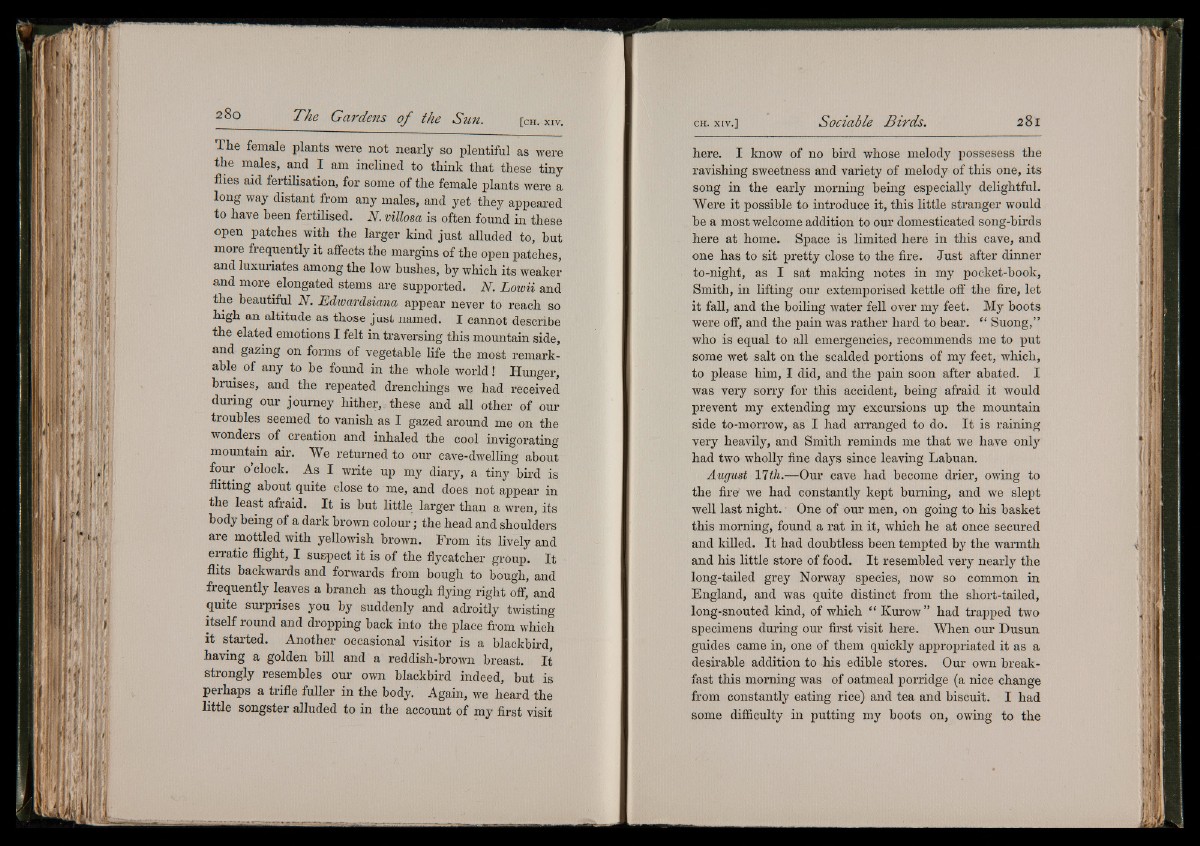
The female plants were not nearly so plentiful as were
the males, and I am inclined to think that these tiny
flies aid fertilisation, for some of the female plants were a
long way distant from any males, and yet they appeared
to have been fertilised. N. vittosa is often found ha these
open patches with the larger kind just alluded to, but
more frequently it affects the margins of the open patches,
and luxuriates among the low bushes, by which its weaker
and more elongated stems are supported. N. Lowii and
the beautiful N. Edwardsiana appear never to reach so
high an altitude as those just named. I cannot describe
the elated emotions I felt in traversing this mountain side,
and gazing on forms of vegetable life the most remarkable
of any to be found in the whole world! Hunger,
bruises, and the repeated drenchings we had received
during our journey hither, these and all other of our
troubles seemed to vanish as I gazed around me on the
wonders of creation and inhaled the cool invigorating
mountain air. We returned to our cave-dwelling about
four o’clock. As I write up my diary, a tiny bird is
flitting about quite close to me, and does not appear in
the least afraid. It is but little larger than a wren, its
body being of a dark brown colour; the head and shoulders
are mottled with yellowish brown. From its lively and
erratic flight, I suspect it is of the flycatcher group. It
flits backwards and forwards from bough to bough, and
frequently leaves a branch as though flying right off, and
quite surprises you by suddenly and adroitly twisting
itself round and dropping back into the place from which
it started. Another occasional visitor is a blackbird,
having a golden bill and a reddish-brown breast. It
strongly resembles our own blackbird indeed, but is
perhaps a trifle fuller in the body. Again, we heard the
little songster alluded to in the account of my first visit
here. I know of no bird whose melody possesess the
ravishing sweetness and variety of melody of this one, its
song in the early morning being especially delightful.
Were it possible to introduce it, this little stranger would
be a most welcome addition to our domesticated song-birds
here at home. Space is limited here in this cave, and
one has to sit pretty close to the fire. Just after dinner
to-night, as I sat making notes in my pocket-book,
Smith, in lifting our extemporised kettle off the fire, let
it fall, and the boiling water fell over my feet. My boots
were off’, and the pain was rather hard to bear. “ Suong,”
who is equal to all emergencies, recommends me to put
some wet salt on the scalded portions of my feet, which,
to please him, I did, and the pain soon after abated. I
was very sorry for this accident, being afraid it would
prevent my extending my excursions up the mountain
side to-morrow, as I had arranged to do. It is raining
very heavily, and Smith reminds me that we have only
had two wholly fine days since leaving Labuan.
August 11th.—Our cave had become drier, owing to
the fire1 we had constantly kept burning, and we slept
well last night. One of our men, on going to his basket
this morning, found a rat in it, which he at once secured
and killed. It had doubtless been tempted by the warmth
and his little store of food. It resembled very nearly the
long-tailed grey Norway species, now so common in
England, and was quite distinct from the short-tailed,
long-snouted kind, of which “ Kurow” had trapped two
specimens during our first visit here. When our Dusun
guides came in, one of them quickly appropriated it as a
desirable addition to his edible stores. Our own breakfast
this morning was of oatmeal porridge (a nice change
from constantly eating rice) and tea and biscuit. I had
some difficulty in putting my boots on, owing to the